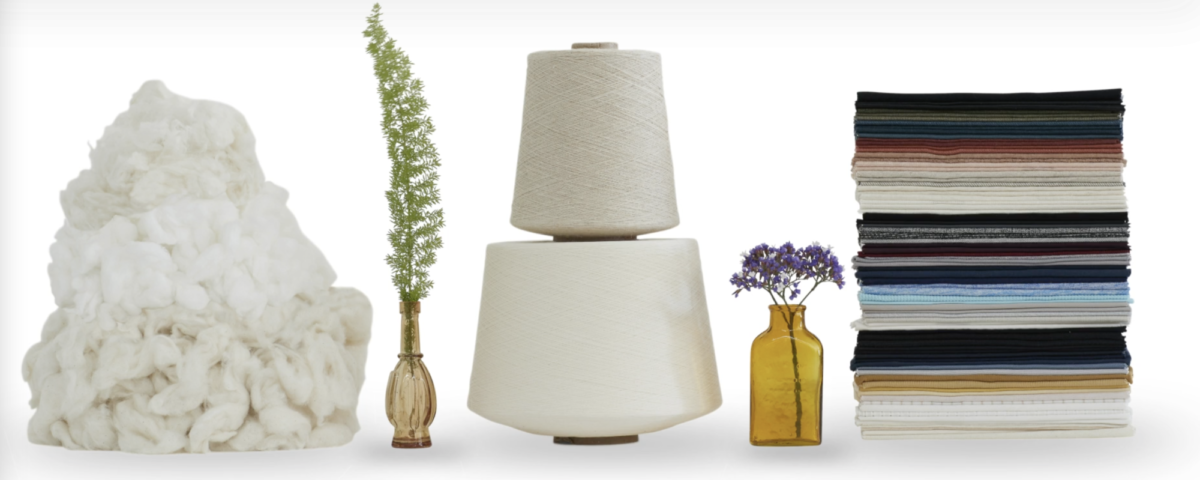





Keep this story going! Share below!
Circular Systems combines both innovation and sustainability to create products with a net-positive impact on this world. Through a line of technologies like Agraloop™, Texloop™ and Orbital™, the company is able to transform remnants of food and medicine crops into BioFibre™, create material from textile waste, and produce high-performing materials using organic and recycled fibre. All these advancements are actively contributing to offset the environmental effects of the fashion industry while helping to solve many of the United Nations Sustainable Development Goals, especially Responsible Consumption and Production.
Waste is a global problem, and the team at Circular Systems is well aware of that. This has guided the company to create products that are circular in design and have a net-positive effect on the world. Crop remnants are abundant, but in most cases are not dealt with properly or effectively. Every year, 200+ million tons of banana waste and 20+ million acres of rice straw are left to rot or burn, releasing methane and carbon into the atmosphere (Circular Systems, 2021). The effects of these practices are devastating, contributing to more than 250,000 deaths annually (Circular Systems, 2021).
The Agraloop™ process can offset the effects of traditional crop-waste management and contribute to a healthier and happier planet. The process incorporates a specialized wet processing technique. This approach can extract fibre and bio-chemicals from the stems and leaves of crops including oilseed hemp/flax, CBD hemp, banana, and pineapple. With the by-products of this technique, the Agraloop can transform and refine the remnants of food and medicine crops into a high-grade fibre called BioFibre™ and fertilizers for future harvests. With this BioFibre, Circular Systems is able to produce high-value fabric, yarn, and fibre to create a large range of products, from clothing to home goods.

The inspiration behind Circular Systems was to develop low impact materials for the fashion industry. Due to the company's immense knowledge of the industry, they were able to foster relationships with multinational corporations around the world. A goal for Circular Systems is to replace cotton entirely, since as the population grows, we will begin to see a shortage of materials. Their products will help displace the need for synthetic materials and fill in the demand for cotton in a net-positive way. This will both benefit the environment and the local economies they operate in.
The overall impact of Circular Systems' innovation is immense. Their Agraloop™ BioFibre™ is easily one of the most industry-shocking innovations in the world of recycled fibres. The impacts from this will be seen for years to come. This is due to the amount of emissions and methane gas that are no longer being emitted into the atmosphere in the form of rotting banana waste or burning rice straw. It is companies such as Circular Systems that are changing the world for the better. It is largely understood that if we continue our processes of wasting organics and polluting landfills, that our Earth cannot withstand it for much longer. This is the long-term impact that this company has sought to partially solve by creating something usable from waste that would otherwise be harmful to the environment.
On a short-term scale, the company is providing the fashion industry with valuable fibres that are used in the making of clothes. The benefit to this is that the fashion industry now has its eyes set on some level of sustainability. Instead of using newly harvested cotton or other fibres, clothing can now be made from reclaimed materials.
The long and short-term impacts are portrayed by the company's achievements to date. For starters, Circular Systems was awarded the H&M Foundation Global Change Award 1st Prize in 2018. This is a huge honour for any organiaztion to earn and it shows that the company is making global change. There is also evidence of their impact when looking at their product. The sheer amount of waste that is reduced and turned into valuable fibres is incredible, and for that, there is a lasting impact.
Circular Systems’ innovation has created unique and sustainable fibres such as Agraloop™, Orbital™ and Textloop™ which have caught the attention of major brands such as Nike, Converse, and H&M. Their textiles are soft, comfortable, sustainable, and meet the durability regulations of their partners. They are capitalizing on consumer demands for more sustainable fashion by supplying large, influential companies with affordable alternatives to non-sustainable fabrics made from 100% new material.
Circular Systems’ Agriloop™ technology utilizes a calculated percentage of crop waste to convert into fashion fibres. This allows the maximum production of sustainable products made from plant materials without depleting vital nutrients from the soil. Circular Systems creates innovations and system designs such as these that focus on holistic environmental health and sustainable development. These innovations create sustainable solutions that provide bioenergy, bio-chemicals as well as high-end fibres. Promoting responsible production and consumption, creating sustainable jobs within communities, and providing clean energy to local communities.
Circular Systems work alongside regional farmers to restore farmland by applying the practice of their soil amendments. This technology can additionally be used in various climates and hemispheres by transforming a diverse range of crop wastes into new and sustainable products, effectively reducing the textile industry’s contributions to landfills and decreasing demand for new unsustainable materials. The use of these systems will not only improve resource efficiency but also have positive trickle-down effects that strengthen farming communities, create jobs for women in these places, protect the sea from the effects of over farming, and expand our collective view on sustainability.
Get stories of positive business innovations from around the world delivered right to your inbox.
Geof Kime, Co-Founder / COO


Circular Systems is a Social Purpose Corporation, with both innovation and sustainability rooted at its core. They have a concentration on material science, and on the development of circular and regenerative technologies.